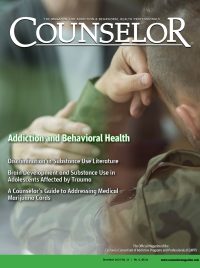Share
How does Alcoholics Anonymous (AA) tackle the problem of memory and relapse, that mysterious inability to learn from experience? There are a number of ways, which I will discuss in this article.
The Casual Relapse
AA meetings provide relapse-prone members with a mnemonic device to give the memory of the venom in one sip sufficient force. AA helps to prevent what the authors of the “Big Book,” or Alcoholics Anonymous (Alcoholics Anonymous World Services, 2001), refer to as a “casual” relapse. This relapse is distinguished by such thoughts as “One won’t hurt,” “I can handle it now,” and “This time will be different.”
Newcomers and those in long-term recovery alike are armed with a number of tools, including the following:
- Morning (and/or other) spiritual practices, with built-in reminders of problem solving
- Sponsors as living examples that the program works, and as reality checks when the brain is fogged by craving or stress
- Sponsors as guides to working the AA steps that directly address forgetting, which start with Step Four, “A Searching and Fearless Moral Inventory” and peak with Step Nine “Making Amends.” A consciousness unburdened of shame and guilt, now eager for sharing its own story to help others, is a consciousness completely free to remember that one will always hurt, and just exactly why. This benefit is spelled out in the text as the “Step Nine Promise: We will not regret the past nor wish to shut the door on it”(Alcoholics Anonymous World Services, 2001, p. 83).
- Working with newcomers who are shaking and demoralized to serve as a wake-up call. The sober alcoholic who walks away from a brother or sister battered by active use has been powerfully vaccinated against thinking “After all this time, surely I can have just one.”
- The power of the Serenity Prayer to calm and clarify consciousness, giving the mind two rules of thumb by which to take the measure of any problem: accept it or change it
- The recognition of the “phenomenon of craving,” (Alcoholics Anonymous World Services, 2001, p. xxviii) as a tool in itself and as a basis for identification
- Slogans like “one day at a time,” shrinking the problem of endless abstinence and defining achievable success
Of course, there are also all the books and literature to read and discuss, and undoubtedly some tools readers will add to their own list. All these tools have one thing in common: they turn attention away from beliefs that serve only craving, and they invite a mental state that is open to facts and alternatives. They restore the power of choice.
The Deliberate Relapse
So far, we have laid out how AA helps prevent casual relapse. What about that other experience, the one the Big Book has christened a “deliberate” relapse, most recognizable nowadays by some sort of expletive even in the those who are purest of tongue (e.g., “F— it” or something similar). In this case, there is no thought of controlling use or consideration of who might get hurt. AA does not explicitly say too much about preventing this state of mind, but two powerful generalizations define the problem and illuminate the solution.
Step Three: Surrender
Introducing Step Three as a critical solution: the Big Book authors define the problem as, “The alcoholic is an extreme example of self-will run riot” (Alcoholics Anonymous World Services, 2001, p. 62).
The founder of cognitive behavioral therapy, Aaron Beck, called this state of mind “low frustration tolerance” (Beck, Wright, Newman, & Liese, 1993). Whatever you call this particular rose, her root is a demanding attitude that cannot take “no” for an answer from life. As frustration accumulates (a relapse process distinct from fading memory, even when simultaneous), an expletive often announces the breaking point and a violent decision to drink. If this is not to happen, it must be replaced by a different decision. Only a fundamentally different attitude can make that possible. Whatever your theology, actual AA experience is that “When I ‘let go and let God,’ I think more clearly and wisely” (Alcoholics Anonymous World Services, 1990, p. 320). Even the willingness to let go of demand opens a consciousness to making wiser decisions, and ones that can accept facts as facts and stop pounding the demands of desire and fear on the pitiless wall of reality.
Step Four: Moral Inventory
Introducing Step Four: the Big Book observes, “Resentment is the number one offender. It destroys more alcoholics than anything else” (Alcoholics Anonymous World Services, 2001, p. 64).
Has anyone ever cursed and picked up a drink without resentment? A military member once shared his take on one variation of the experience as, “I’ll show you! I’ll swallow a grenade!”
In contrast to the casual relapse, which is characterized by buried resentment, the deliberate relapse is a state of distress and anything but serene. A Big Book contributor posits eloquently, “My serenity is inversely proportional to my expectations” (Alcoholics Anonymous World Services, 2001, p. 420). An equally pithy program truism often quoted in meetings is, “An expectation is a resentment waiting to happen.”
How Does AA Help with the Challenge of Expectations and Disappointment?
Step Three “Surrender” and Step Eleven “Prayer and Meditation” instruct us to relinquish the stress-inducing demands of self-will using prayer, meditation, writing, sharing, and even “acting as if.”
Steps Four through Nine, those challenging inventory-and-action steps, reduce inevitable resentments and expectations themselves, and Step Ten “Continuous Inventory” preserves and nurtures a consciousness that will not use the foibles of others as an excuse to relapse. The alcoholic doing all of that has put several degrees of separation between the self and the first drink. No longer blinded by rage, resentment, or intolerable frustration, facts and alternatives reappear. As with preserving memory, actively working the program restores the power of choice.
These two states of mind, casual and deliberate, have much in common. At their source, the brain experiencing alcohol as a need has a consciousness dominated by craving. Working to prevent one sort of relapse almost always prevents the other. That said, clinical tools may prevent or reduce these states of mind. To name just a few, aversion therapy may strengthen the realization that alcohol is a poison, not a treat; anticraving drugs may lessen its appeal; cognitive behavioral therapy may fine-tune awareness of thoughts that invite disaster; mindfulness approaches reduce stress and cultivate a mindset of “seeing clearly,” the exact opposite of the mental states that precede relapse; trauma therapies may diffuse intolerable memories that demand relief; and psychotropic medications may regulate energy and restore reason, creating a level playing field for those with other diagnoses. You get the idea.
To summarize, AA understood from the beginning that prevention of relapse requires the avoidance of two states of mind, voicing two different kinds of relapse decisions: the casual relapse attitude that alcohol is a friend, that there will be no loss of control and no harm from taking only one drink, and the overtaxed consciousness of the deliberate relapse, in which alcohol promises the only relief possible. AA injects in those with the willingness to absorb it, a free, lifelong, almost universally available antidote to the forgetfulness of the casual moment of decision. At the very same time, Twelve Step recovery also loads up a paradoxical toolbox for dealing with frustration by accepting the fact that you cannot control life. For preventing the deliberate decision to drink when reality defies will. Finally, AA prevents relapse through a mighty force it brought into the world of addiction in 1935: the power of a tribal and spiritual energy that gathers from “one drunk talking to another.” Some call this barbless rose by yet another name: love.
References
- Alcoholics Anonymous World Services. (1990). Daily reflections. New York, NY: Author.
- Alcoholics Anonymous World Services. (2001). Alcoholics anonymous (4th ed.). New York, NY: Author.
- Beck, A. T., Wright, F. D., Newman, C. F., & Liese, B. S. (1993). Cognitive therapy of substance abuse. New York, NY: Guilford Press.
About Me
George DuWors, MSW, BCD, MAC, is a licensed clinical social worker specializing in addictions since 1972. He has contributed to Counselor since the nineties. DuWors authored White Knuckles and Wishful Thinking: Learning From the Moment of Relapse in Alcoholism and Other Addictions (2000), and most recently Getting It: Eight Facts That Fuel Recovery (Uh, If We Face Them) (2018). Maintaining an addictions practice in Everett, Washington, he has presented “Motivation for Maintenance” workshops across North America and in the United Kingdom. DuWors is an enthusiastic trainer who loves to do keynotes and consultations. Read his articles at gettingitworkbook.com.











 Counselor Magazine is the official publication of the California Association of Addiction Programs and Professionals (CCAPP). Counselor offers online continuing education, article archives, subscription deals, and article submission guidelines. It has been serving the addiction field for more than thirty years.
Counselor Magazine is the official publication of the California Association of Addiction Programs and Professionals (CCAPP). Counselor offers online continuing education, article archives, subscription deals, and article submission guidelines. It has been serving the addiction field for more than thirty years.